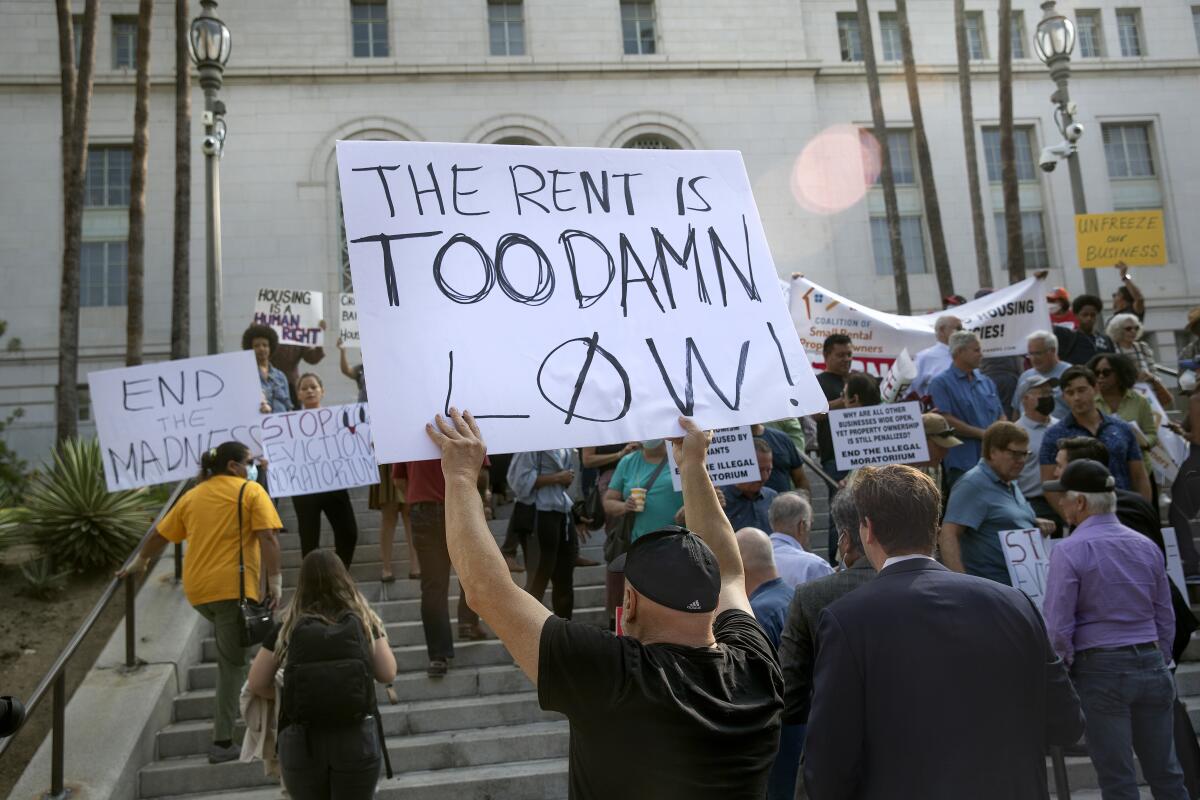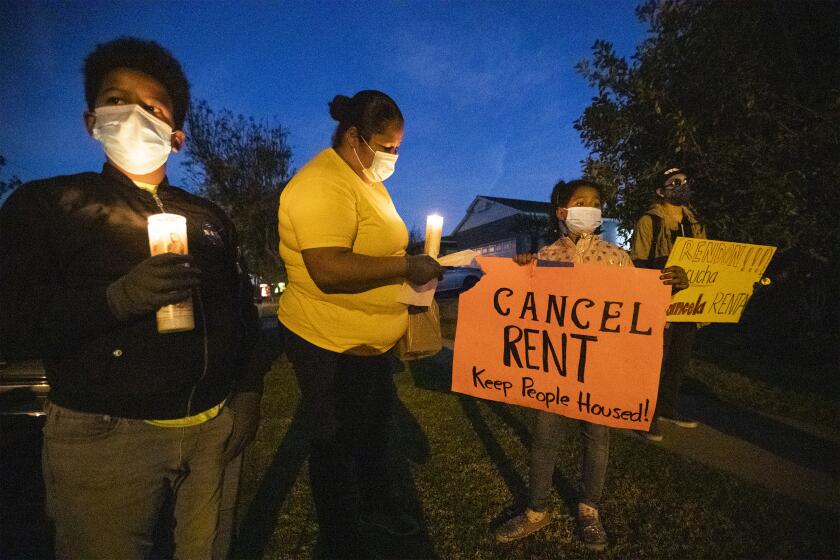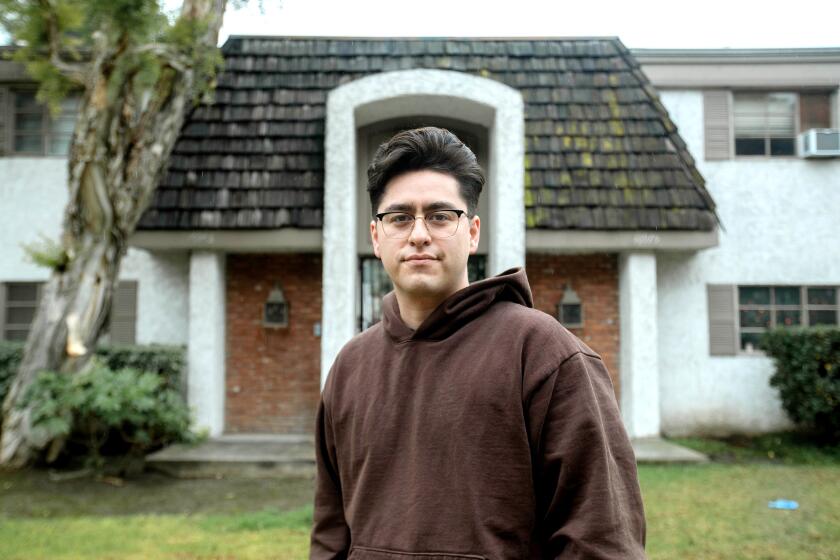L.A. moves closer to ending COVID-19 eviction protections

Some of the countryâs longest lasting COVID-19 protections against eviction moved closer to ending Wednesday when a Los Angeles City Council committee advanced a measure to repeal the rules at the end of January.
Under the plan, starting Feb. 1, L.A. landlords will once again be able to evict tenants for unpaid rent and other reasons even if tenants have been affected by COVID-19. The cityâs current rules have prohibited such evictions since March 2020.
âWe must put in place long-term protections for our tenants while still preserving the economic well-being of our small, mom-and-pop landlords,â said Council President Nury Martinez who also chairs the cityâs Ad Hoc Committee on COVID-19 Recovery and Neighborhood Investment. âWe canât forget that these policies are intended to ensure that our homeless crisis does not become any worse as a result of the pandemic.â
The full City Council still needs to vote on the plan at an upcoming meeting before it takes effect.
Some of the nationâs strongest protections against eviction and rent increases could end in January after city housing officials recommended their expiration.
The committeeâs decision followed an hour of public testimony from landlords and tenants who pleaded with councilmembers to hear their plight. Many landlords identified themselves as owners of small apartment buildings who have been struggling under the weight of the eviction restrictions for years.
Some said theyâve been unable to move into their own units because of they cannot remove nonpaying tenants. Others described circumstances in which theyâre owed tens of thousands of dollars in back rent while also having to pay increased city fees and higher, inflation-driven maintenance costs.
âThe economy has fully been reopened. Vaccines are widely available. The president of the United States said the pandemic is over,â said Fred Sutton, a senior vice president at the California Apartment Assn., a landlord trade group. âThe conditions of 2020 are completely different than today.â
By contrast, tenants argued that the protections have been a lifeline while dealing with economic and health ravages during the pandemic. Arnulfo Soria, a renter in South L.A., said that heâs lost work and had COVID-19 four times while sharing an apartment with his four children and five grandchildren.
The eviction protections âare the only thing that has kept us from becoming homeless,â said Soria, 52. âLifting the protections is reckless and inhumane.â
Soria, who is an organizer with tenant group Alliance of Californians for Community Empowerment, and others pushed the council to add stronger permanent tenant protections before letting the emergency orders expire.
The committee considered a battery of other rental provisions Wednesday. One proposal would allow landlords to resume rent hikes in rent-controlled apartments â about three-quarters of the cityâs apartment stock â starting in February 2024. Such increases in those buildings also have not been allowed since March 2020. Committee members also want to consider expanding citywide prohibitions against evicting tenants without documented lease violations to cover more apartments.
As part of its COVID-19 rules, the city of Los Angeles is prohibiting rent increases for tenants in rent-controlled buildings. Elsewhere rents have gone up by double digits in recent months.
Committee members said they were trying to balance the hardships faced by tenants and landlords since the beginning of the pandemic and stressed that the cityâs emergency protections have lasted longer than other big cities across the country.
The city housing department first proposed ending the COVID 19 anti-eviction rules at the end of the year. But Wednesdayâs action would cover tenants for another month.
âWe all know that December is a month with holidays and extra expenses,â said Councilmember Mitch OâFarrell, who announced heâd be providing an additional $3 million in rental assistance funds to tenants in his district, which covers Echo Park and surrounding areas. âRenters should be given a little extra time to get back on their feet.â
More to Read
Sign up for Essential California
The most important California stories and recommendations in your inbox every morning.
You may occasionally receive promotional content from the Los Angeles Times.






![[20060326 (LA/A20) -- STATING THE CASE: Marchers organized by unions, religious organizations and immigrants rights groups carry signs and chant in downtown L.A. "People are really upset that all the work they do, everything that they give to this nation, is ignored," said Angelica Salas of the Coalition of Humane Immigrant Rights. -- PHOTOGRAPHER: Photographs by Gina Ferazzi The Los Angeles Times] *** [Ferazzi, Gina -- - 109170.ME.0325.rights.12.GMF- Gina Ferazzi/Los Angeles Times - Thousands of protesters march to city hall in downtown Los Angeles Saturday, March 25, 2006. They are protesting against House-passed HR 4437, an anti-immigration bill that opponents say will criminalize millions of immigrant families and anyone who comes into contact with them.]](https://ca-times.brightspotcdn.com/dims4/default/34f403d/2147483647/strip/true/crop/1983x1322+109+0/resize/840x560!/quality/75/?url=https%3A%2F%2Fcalifornia-times-brightspot.s3.amazonaws.com%2Fzbk%2Fdamlat_images%2FLA%2FLA_PHOTO_ARCHIVE%2FSDOCS%2854%29%2Fkx3lslnc.JPG)


